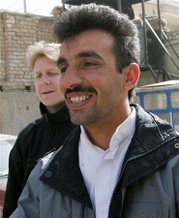JOURNALIST RELEASED: HOPE RISES FOR OTHERS
 Baghdad, (WPI) - Bowing to increased international pressure and after an emotional, televised plea by his parents for his release, a Reuters journalist was finally freed by his captors after eight months yesterday.
Baghdad, (WPI) - Bowing to increased international pressure and after an emotional, televised plea by his parents for his release, a Reuters journalist was finally freed by his captors after eight months yesterday. Samir Mohammed Noor was the third journalist working for Reuters to be freed by his abductors after two others were released a week ago.
Noor, a 30-year-old freelance television cameraman, was kidnaped from his home in the violent northern city of Tal Afar in early June during a sweep of his neighborhood by Iraqi and U.S. troops. During his captivity Noor spent time in Baghdad's infamous Abu Ghraib prison and more recently at Camp Bucca in southern Iraq.

At least two journalists for other international media organizations are still being held by occupation forces. Their whereabouts are unknown and their abductors have made no demands or statements about releasing them.
The father of the kidnapped Iraqi journalist begged his captors in a statement televised on Monday that he was not their enemy and would tell their story. In a direct appeal broadcast on CNN eight months after the 30-year-old Noor was abducted, Majed Mohammed Noor urged his son’s kidnappers to release him alive.
"I hope that you heard the conviction in Samir’s voice when he spoke of your country. That was real," he said. "He is not your enemy. When you release him alive, he will tell your story with that same conviction."
In a strikingly similar event, the father of an American journalist abducted on January 7 made several direct appeals to her captors via televised statements.
Jill Carroll, 28, a freelance journalist working for The Christian Science Monitor, was abducted on January 7 by kidnappers who also killed her Iraqi interpreter. Her family has made several direct appeals to her captors via televised statements.
On Jan. 19 Carroll’s mother appealed for her daughter's release after her captors threatened to kill her if U.S. authorities failed to release all Iraqi women in military custody.
Mary Beth Carroll told CNN that video images gave her hope that her daughter is alive but also have "shaken us about her fate."
"I, her father and her sister are appealing directly to her captors to release this young woman who has worked so hard to show the sufferings of Iraqis to the world," she said.
Jim Carroll pleaded in a statement televised on Monday that his daughter was not an enemy and would tell their story.
In remarkably similar language to the Noor plea, Carroll said, "I hope that you heard the conviction in Jill's voice when she spoke of your country. That was real," he said. "She is not your enemy. When you release her alive, she will tell your story with that same conviction."
Carroll's abductors have threatened to kill her if all women prisoners in Iraq were not freed, but their deadline of Friday has passed with no word on her fate.
She was the 36th reporter to be kidnapped in Iraq since April 2004, according to the New York-based Committee to Protect Journalists. Six of them have been killed.

"We are glad that all journalists working for Reuters in Iraq are now free," said Reuters Global Managing Editor David Schlesinger.
"We are concerned, however, that it has taken so long -- nearly eight months in the case of Samir -- to secure their release, despite a lack of credible evidence against them."
Two Reuters journalists from the uncontrollable city of Ramadi, cameraman Ali al-Mashhadani and reporter Majed Hameed, who also works for Al-Arabiya television, were freed last January 15 after five and four months in US custody respectively.
Still being held is a cameraman from the northern city of Mosul who works for the U.S. television network CBS. He has been in captivity since April, 10 months, with no word about his fate from his abductors.
Reuters and numerous international media rights groups have repeatedly protested the long U.S. detentions of journalists without any legal process.
The news organizations have particularly criticized the military's refusal to act faster on US suspicions about the reporters' legitimate journalistic activities of covering the occupation and insurgency.
Reuters is gathering information from the three released journalists to learn more about the circumstances of their arrests and detention.
Schlesinger said: "Nothing we have heard so far from either the U.S. military or our colleagues indicates that suspicions were raised against them for any other reason than their courageous and honest pursuit of professional journalism."
The Committee to Protect Journalists reports that since the US invasion in March 2003, 60 journalists have been killed in Iraq.
By Nationality they are:
• Iraqi: 41
• European: 9
• Other Arab countries: 3
• United States: 2
• All other countries: 5
By Circumstance:
• Insurgent action: 36 (Includes crossfire, suicide bombings, and targeted killings.)
• U.S. fire: 13
• Iraqi armed forces, during U.S. invasion: 3
• Crossfire or other acts of war in which source unconfirmed: 8
By Job:
• Photojournalists: 20 (Includes still photographers and camera operators.)
• Reporters and editors: 30
• Producers: 7
• Technicians: 3
Samir Mohammed Noor was abducted by Occupation forces. Jill Carroll was abducted by Insurgent forces. Data is kept only on the number of journalists kidnapped by Insurgents. The number of journalist held by Occupying forces is unknown.


0 Comments:
Post a Comment
<< Home